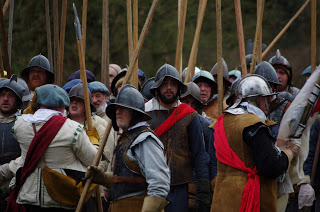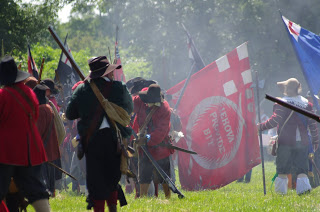What's In A Name?
Having been asked the tricksy question,
What is it: The English Civil War, The British Civil Wars or the Wars of the Three Kingdoms?
 |
| Pictures from Holly Holy Day 2020, Nantwich's annual celebration of the battle |
I will attempt to answer it... but first, some definitions.
I must point out that all of the following are valid terms, but some are possibly more valid than others (to bastardise some Orwell).
We'll start with...
The English Civil War (ECW), probably the most widely known and used term to describe the series of conflicts that occurred in the British Isles during the reign of Charles I. Has it's problems, according to an old joke it wasn't English, it wasn't civil, and it wasn't just a singular war. But in the common vernacular, widely understood.
The British Civil Wars (BCW) a much more accurate term than ECW: British including all of the nations that existed in the British Isles. Some take issue with the word 'British' arguing that Britain (a name that is oft used to refer to the modern United Kingdom) didn't exist, and offence is taken on behalf of the Irish and Scots. British in this context is the geographical name, not a political noun. Wars (plural) is much better as there were many separate conflicts. Probably my preferred term.
The Wars of the Three Kingdoms is the in vogue term for the series of conflicts. Personally not a fan as it sounds like a scene from a Peter Jackson corruption of Tolkien. Not to be confused with the Wars of the Three Kingdoms that took place in the third century in what is now modern day China. The separate kingdoms of Ireland, England and Scotland just so happened to have the same person as their king, they were very separate countries and seen as foreign to one another.
By the end of Victoria's reign, the historian S.R.Gardiner called the period of conflicts the Great Civil War.
Marxists and socio-political historians refer to the period as the English Revolution, which ultimately included the Glorious Revolution.
Those are the general names for the conflicts that arose in the British Isles from 1639 until the Restoration. The period can, more accurately, be broken down into it's separate conflicts. I must point out that each of these definitions are massively simplified, but to do each justice would be several PhD's worth of writing.
The Bishops Wars 1639-1640 - two Anglo Scottish wars that were a Scottish reaction to Charles I's attempt to reform the Scottish church.
The Confederate War 1641-1652, also known as the Irish Uprising, and the Eleven Years War. Started as a combination of Irish resentment against the Protestant settlers and a desire to protect the religious freedom to practice Catholicism. A conflict that waxed and waned, before being brutally put down by Cromwell and the New Model Army in 1652.
The First Civil War 1642-1646, the bit that can accurately be called the English Civil War; much beloved by the Victorians who lapped up the cavaliers versus roundheads imagery. Included lots of fighting in Scotland too between Montrose and the Covenanters.
The Second Civil War 1648, an imprisoned Charles I secretly negotiated with the Scots to provide an army to restore him to power (in return Presbyterianism would be imposed in England). Main conflict was the Preston campaign, but a number of Royalist risings took place across England and Wales. As a consequence of these machinations Charles probably sealed his own fate and booked himself a date with an executioner.
Anglo-Scots War 1649-1652, so closely intertwined with, and effectively became...
...The Third Civil War 1649-1652 With Charles's execution, Scotland proclaimed Prince Charles, King. Charles II tried to reclaim the English throne by starting Royalist risings first in Ireland, and then in Scotland. Cromwell invaded Scotland which appeared to be Charles II's heartland of support (many Covenanters had swapped allegiance, and now known as Engagers). Culminated in the defeat of the Royalist cause at Worcester.
But that wasn't an end to it, there were a number of risings that whilst had a large local impact, never gained any national traction during the period 1652-1659.












Very useful thanks. Anyone googling for books would do well to be aware of 'The Great Rebellion' as well. Seasons best wishes.
ReplyDeleteAwesome account and we will endeavour to join in again this year, COVID-19 permitting !
ReplyDeleteThere is an interesting discussion of this in the introduction to 'The Civil Wars, A Military History of England, Scotland and Ireland 1638-1660,' Ed. Kenyon and Ohlmeyer. The 'Puritan Revolution' is also mentioned in passing.
ReplyDeleteA good summary of the terms. For me the best catch all is ‘Wars of the Kingdoms’.
ReplyDeleteSo many names, yet possibly the most inappropriate is the one that is used. As with all things, I blame the Victorians
ReplyDelete